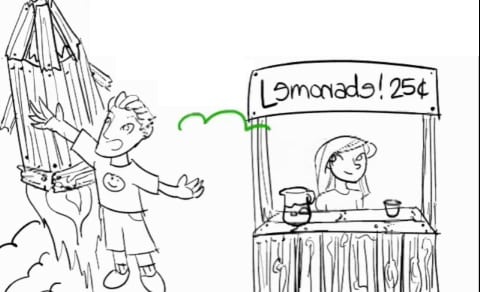Of the four dichotomies, the largest discrepancy lies in the difference between Sensors and Intuitives. Whereas there is an approximate 50/50 split in the population between the other preferences, a full 70% of the population prefers Sensing versus only 30% favoring Intuition.
When you distill it down, the difference between Sensors and Intuitives is this: Sensors prefer reliability of information, and Intuitives prefer speed and depth of insight. This ends up manifesting itself a couple of unique ways. First, Intuitives learn to trust pattern recognition to help them understand information quickly and see things that aren’t ‘there’. Basically, they extrapolate large amounts of information from only a few data points.
Sensors, of course, have this same ability. But they don’t trust it, and so they don’t hone it. Instead, they trust reliable information – things that can be verified in the Real World. Therefore, they become masters of historical information – their own history as well as other people’s. They also become fantastic at manipulating objects in real time. There is no need to question reality when it’s right there in front of you. Reality is reliable. Speculation isn’t.
Second, how they see information informs how both these preferences see time. If real, reliable, solid information is what you choose to focus upon, then the here-and-now context becomes far more important, as well as past information (which used to be the here-and-now context). Sensors can’t rely on what hasn’t happened yet, so the future becomes far less interesting. On the other hand, Intuitives are already comfortable seeing what ‘isn’t there’ – as in, they’re comfortable theorizing and speculating on what could be in both the here-and-now as well as into the future. The past doesn’t really hold their interest any more than a reference point for future predictions.
Third, these differences alter both values and basic interests. For Sensors, values surround things like family, tradition, getting into action, old friends, etc… these are all rooted in the known and knowable, and therefore can be trusted. For Intuitives, values focus more on the cerebral – possibilities, memes, paradigms, perspectives and concepts. Conversation will generally revolve around these things, with little interest in small talk.
Both Sensors and Intuitives have an important role. Sensors often “hold down the fort” – uphold infrastructures that keep us going as a society. Intuitives are generally the “trailblazers” – coming up with new ways of looking at and doing things which fashion new technologies and paradigms. It makes sense that fewer Intuitives would be needed – too much innovation and everything collapses. But without innovation, the world stagnates.
Understanding and appreciating these differences is how we cooperate to create both a stable system as well as pathways to whole new worlds.
When you’re ready, here are five ways we can help you grow…
1. Reclaim Authorship of Your Life (Free Audio): Become the Main Character Your Own Life
2. Regulate your Body, Emotions, Thoughts, & Intuition with Self-Regulation Mastery
3. Understand yourself at a deeper level with a Personality Owners Manual
4. Master the Art of “Deep Reading” people in Profiler Training
5. Rewire your Brain & Build a Life that Fits You in the Personality Life Path


Share:
What's the REAL difference between "Introverts" and "Extraverts?"
Are "Thinkers" Rational, and "Feelers" Irrational?
90 comments
It can seem that way at times for you, perhaps, but INFJ and INTJ are way more different than it would seem. INFJ uses extraverted feeling and introverted thinking, while INTJ uses introverted feeling and extroverted thinking.
I could see how, when you may be stressed, you may use some of your shadow traits (opposite poles) but you are the type you are.
AM and her ISFJ have been together for over 30 years, so I don’t think your statement holds.
For years I’ve been testing and the results always comes up as an INTJ and the descriptions ring as true. However my closest friend (don’t have many of those) say that I am more emotional and closest to an INFJ. However I don’t believe that I understand people’s emotion or even my own most times. I do recognise emotional aspects though and I believe this is experience and pattern recognition, anticipating certain moods and reactions because I’ve seen them before and trying to behave better in social contexts because I am learning how to. I react more socially because I am expected to. It always feelslike I am wearing a mask. Then, I have been reading reviews that don’t favour the Mayer-Briggs Theory. It is believed that the Big5 Theory is more accurate and better suited to type personalities. There my results are closer to the INFJ type in comparison but I still struggle with myself. Do you study people so you can learn how to behave in order to have a more successful life? Or do continue living with how you feel comfortable despite the fact that you will always be on the fringes of society, never finding people who understand you, always alone?
Being in INTJ and INFJ mode? It’s normal.
Your Enneagram type plays the role on this. I’m a INTJ type 5. Well, 5w6 for exact.
Maybe your Enneagram is type 4. Would you like to find out?
INFJ and ISFJ can be friends. But in romance, it’s a No. Having relationship with an ENTP/ENFP is better choice.